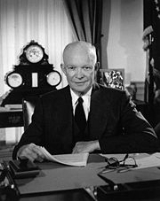
Military-industrial complex
Overview
Military–industrial complex (MIC), or Military–industrial-congressional complex (MICC) is a concept commonly used to refer to policy
and monetary relationships between legislator
s, national armed forces
, and the industrial sector
that supports them. These relationships include political contributions
, political approval for defense spending, lobbying to support bureaucracies, and beneficial legislation and oversight of the industry.
Policy
A policy is typically described as a principle or rule to guide decisions and achieve rational outcome. The term is not normally used to denote what is actually done, this is normally referred to as either procedure or protocol...
and monetary relationships between legislator
Legislator
A legislator is a person who writes and passes laws, especially someone who is a member of a legislature. Legislators are usually politicians and are often elected by the people...
s, national armed forces
Armed forces
The armed forces of a country are its government-sponsored defense, fighting forces, and organizations. They exist to further the foreign and domestic policies of their governing body, and to defend that body and the nation it represents from external aggressors. In some countries paramilitary...
, and the industrial sector
Industry
Industry refers to the production of an economic good or service within an economy.-Industrial sectors:There are four key industrial economic sectors: the primary sector, largely raw material extraction industries such as mining and farming; the secondary sector, involving refining, construction,...
that supports them. These relationships include political contributions
Campaign finance in the United States
Campaign finance in the United States is the financing of electoral campaigns at the federal, state, and local levels.At the federal level, the primary source of campaign funds is individuals; political action committees are a distant second. Contributions from both are limited, and direct...
, political approval for defense spending, lobbying to support bureaucracies, and beneficial legislation and oversight of the industry.
Unanswered Questions

